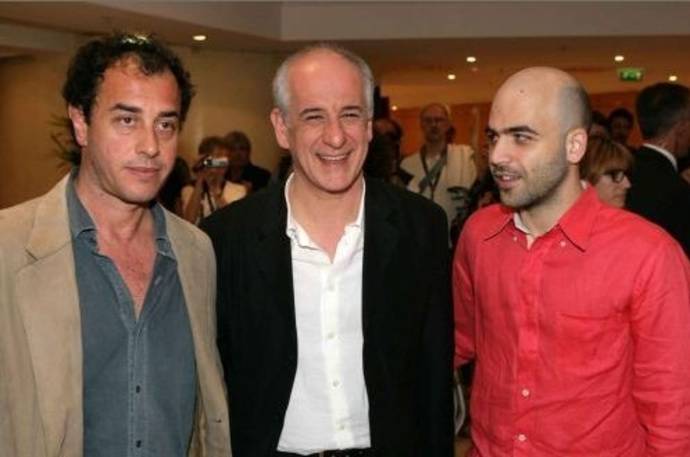


“Gomorra,” the film directed by Matteo Garrone and adapted from Roberto Saviano’s book of the same name, has won major European awards, including the Grand Prix at
Cannes and Best Film at the European Film Awards. It is one of the most highly acclaimed films of the past year, ending up on many critics’ top ten lists. “Gomorra” even had the imprimatur of Martin Scorsese.
But that wasn’t good enough for the
Academy of
Motion Picture Arts and Sciences. When the Academy’s foreign language committee released its shortlist of nominees this week, “Gomorra” wasn’t on it.
The omission stunned many in the film industry, especially critics. Guy Lodge, at the website Incontention.com, called the Academy’s foreign language committee “philistines” for “sidelining
Italy’s astonishing entry.”
“If I had my way, Matteo Garrone’s cinematic gut-punch about the Camorra crime syndicate would be in line for a Best Picture nod, not just a puny ghetto-category citation,” Lodge fumed.
That “Gomorra” would be one of the Best Foreign Language Film nominees was regarded as inevitable by most observers. So what happened?
Film blogger Jeff Wells reported that a member of the Academy’s executive committee told him that “Gomorra” hadn’t “delivered in the way it could or should have. It’s not a matter of it not being heart-warming. It’s a matter of our respecting the film without believing that it really brought the goods home.”
Well, that certainly justifies Lodge’s characterization of the committee members as “philistines.”
Lodge added, “Obviously, the film isn’t going to speak to everyone … what film does? But as I see it, the executive committee isn’t in place to offer personal evaluations of the work at hand; it’s there to ensure that significant achievements are acknowledged.”
“However much they liked or didn’t like ‘Gomorra,’” Lodge wrote, “to blindly ignore the fact that its achievement, as both a feat of storytelling and social investigation, dwarfs those of most of the films shortlisted — not least the contrived melodrama of ‘Revanche,’ the by-the-numbers epic posturing of ‘Tear This Heart Out’ and the comparatively cardboard characterization of ‘The Baader Meinhof Complex’ -- is blatantly obtuse.”
The executive committee, ironically enough, was created by the Academy in response to outrage over the past exclusion of such critically acclaimed foreign films as Brazil’s “City of God,” Germany’s “Edge of Heaven,” Romania’s “4 Months, 3 Weeks, and 2 Days,” and Mexico’s “Silent Light.” The foreign film nominees used to be selected by a “Phase 1 committee” comprising several hundred Los Angeles-based Academy members who would divide up and screen the foreign entries. There were no requirements that members even watched the films under consideration, and the vote tabulation process was bizarrely complicated.
This year, the Phase 1 committee made six initial selections, with the foreign language film award executive committee adding three more, a change ostensibly instituted to prevent outstanding films like “Edge of Heaven”-- or “Gomorra” – from being excluded.
Jonathan Sehring, president of IFC Entertainment, which is releasing “Gomorra” in the United States, told Incontention’s Kristopher Tapley that “I know I speak for the entire country of Italy and a lot of people in the critical community when I say that it just doesn't make sense and there's something wrong with the foreign language committee as a whole,” he told me. “It's still broken.”
Sehring and IFC, however, deserve some blame for failing to properly promote the film, to the Academy and to potential audiences, especially after it swept the European Film Awards in late 2008. IFC’s marketing of “Gomorra” last year was virtually invisible.
Scott Foundas, a film critic with the LA Weekly, suggested that for the Academy, “Garrone's vision of mob life was simply too violently realistic and lacking in Hollywood romanticism for a group of voters who have time and again showered nominations on the glossiest of
Hollywood gangster fare.”
(Not to mention the fact that the Italian films that the Academy has honored in the recent past have been innocuous fare like “Mediterraneo” and “Il Postino” and Roberto Benigni’s execrable “Life is Beautiful.”)
I think Foundas is on to something. “Gomorra” is an important, powerful, but demanding film. It eschews all the familiar trappings of the Mafia movie, particularly the tradition of presenting the narrative from the viewpoint of the Mafiosi. “Gomorra”’s point of view is objective, though not detached. It also flouts genre conventions by not offering us wise godfathers, charismatic rogues, or “I make you laugh?” killer clowns. The film is about a milieu, a world, an all-enveloping system of organized criminality. This is why some who don’t like the film complain that it lacks characters they can “relate to.”
Garrone’s direction also is light-years from
Hollywood, a sort of 21st century neorealism that plunges viewers into the world he depicts with very few signposts to orient them. It takes a little while to make sense of the five separate storylines, which do not converge to bring comforting “closure” a la the Oscar-winning but meretricious “Crash.” The film demands critical engagement from its audiences; you can’t just passively watch it. But if you’re willing to engage with it on its own terms, and not expect it to be “Goodfellas” or “The Godfather,” its rewards are considerable.
So ignore the Academy cretini and see “Gomorra” when it opens here in February. And then read Roberto Saviano’s book, if you haven’t already. It’s even more disturbing than the movie.
Source URL: http://test.iitaly.org/magazine/focus/art-culture/article/oscar-non-piace-gomorra
Links
[1] http://test.iitaly.org/files/6228garrone-tony-saviano1232148420jpg